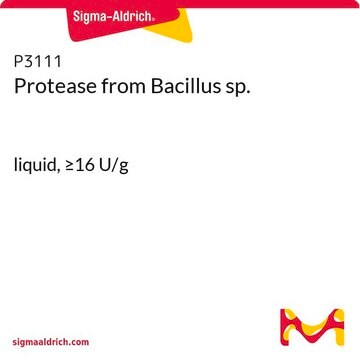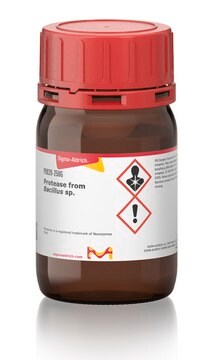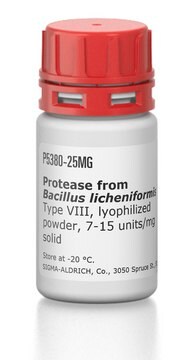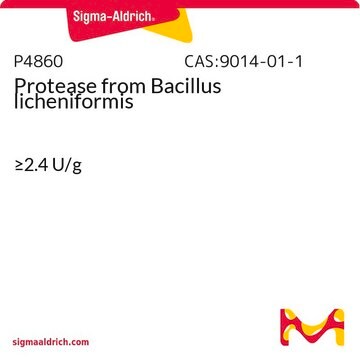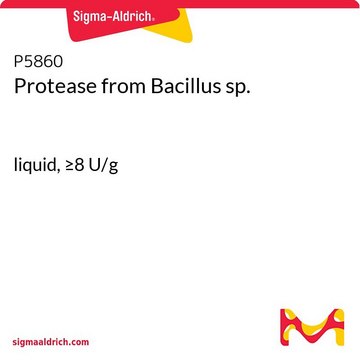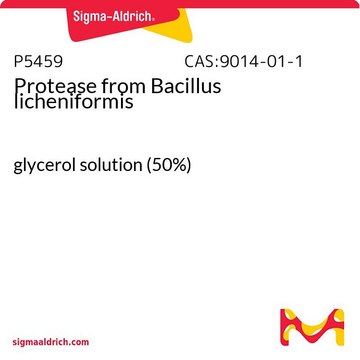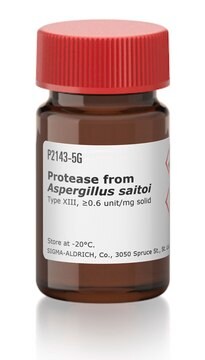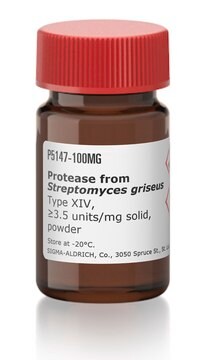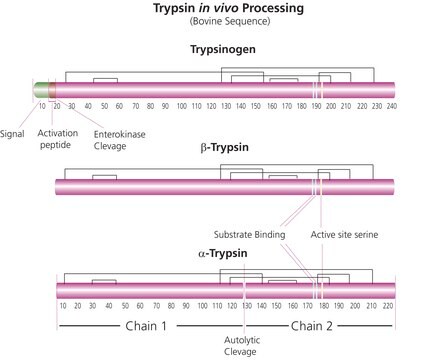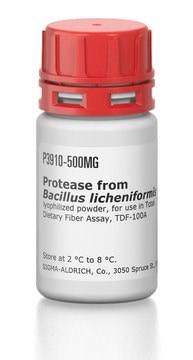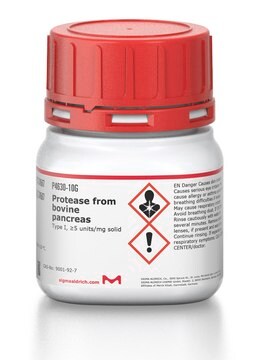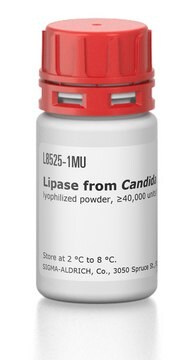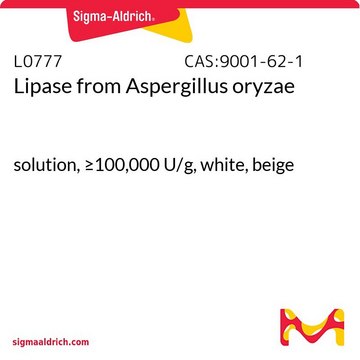P5985
Protease from Bacillus sp.
liquid, ≥16 U/g
Synonyme(s) :
Everlase 16.0 L
Se connecterpour consulter vos tarifs contractuels et ceux de votre entreprise/organisme
About This Item
Produits recommandés
Source biologique
Bacillus sp.
Forme
liquid
Activité spécifique
≥16 U/g
Poids mol.
20--30 kDa
Température de stockage
2-8°C
Vous recherchez des produits similaires ? Visite Guide de comparaison des produits
Catégories apparentées
Description générale
Proteases are ubiquitously found in nature and microbes are the desired source for these enzymes. They are classified into four classes namely aspartic, serine, cysteine and metalloproteases.
Application
Protease from Bacillus sp. has been used to determine its proteolytic activity by spectrophotometric method.
Actions biochimiques/physiologiques
Protease catabolizes proteins by hydrolysis of peptide bonds. Proteases are inactivated by serine active-site inhibitors, such as phenylmethylsulfonyl fluoride (PMSF) and diisopropylfluorophosphate. Proteases, secreted from Bacillus sp., typically have molecular weights ranging from 20,000 to 30,000. They are typically stabilized by Ca2+ and have high isoelectric points. It is highly soluble in detergents at a wide range of pH and temperatures. Protease improves healing process by efficiently removing necrotic materials from wounds. It is extensively used in laundry detergents to remove protein based stains from clothing. In addition, protease is also used in food, pharmaceutical, leather and silk industries. It is a key constituent in biopharmaceutical products including contact-lens enzyme cleaners and enzymatic deriders. Proteases also aid in various physiological processes such as protein turnover, digestion, blood coagulation, fertilization and cell differentiation. It also facilitates growth, cell signaling, the immune response, and apoptosis.
Informations légales
A product of Novozyme Corp.
Mention d'avertissement
Danger
Mentions de danger
Conseils de prudence
Classification des risques
Aquatic Chronic 3 - Eye Dam. 1 - Resp. Sens. 1
Code de la classe de stockage
10 - Combustible liquids
Classe de danger pour l'eau (WGK)
WGK 2
Équipement de protection individuelle
dust mask type N95 (US), Eyeshields, Faceshields, Gloves
Faites votre choix parmi les versions les plus récentes :
Déjà en possession de ce produit ?
Retrouvez la documentation relative aux produits que vous avez récemment achetés dans la Bibliothèque de documents.
Les clients ont également consulté
Irreversible inhibitors of serine, cysteine, and threonine proteases
Powers JC, et al.
Chemical Reviews, 102(12), 4639-4750 (2002)
Isolation, production and characterization of protease from Bacillus sp. isolated from soil sample
Josephine FS, et al.
Journal of Microbiology, 2(1), 163-168 (2012)
Laure El Chamy et al.
Nature immunology, 9(10), 1165-1170 (2008-08-30)
In drosophila, molecular determinants from fungi and Gram-positive bacteria are detected by circulating pattern-recognition receptors. Published findings suggest that such pattern-recognition receptors activate as-yet-unidentified serine-protease cascades that culminate in the cleavage of Spätzle, the endogenous Toll receptor ligand, and trigger
M Du et al.
Journal of animal science, 85(4), 919-927 (2006-12-21)
Mammalian target of rapamycin (mTOR) signaling is one of the main signaling pathways controlling protein synthesis. Leucine treatment upregulates mTOR signaling, which enhances protein synthesis; however, the mechanisms are not well understood. Herein, treatment of C2C12 myoblast cells with leucine
Effect of UV light on microbial proteases: From enzyme inactivation to antioxidant mitigation.
Lante A, et al.
Innovative Food Science & Emerging Technologies, 17, 130-134 (2013)
Notre équipe de scientifiques dispose d'une expérience dans tous les secteurs de la recherche, notamment en sciences de la vie, science des matériaux, synthèse chimique, chromatographie, analyse et dans de nombreux autres domaines..
Contacter notre Service technique